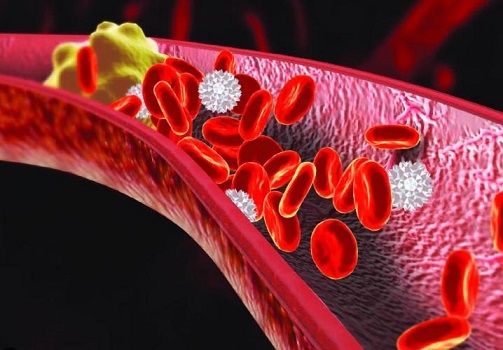Nikhil Prasad Fact checked by:Thailand Medical News Team Aug 17, 2024 1 year, 5 months, 3 weeks, 3 days, 7 hours, 39 minutes ago
COVID-19 Research: As the global fight against COVID-19 continues, the search for effective treatments remains a top priority for the scientific community. The severe complications arising from SARS-CoV-2 infections, including life-threatening inflammatory reactions and thrombotic events (blood clots), have posed significant challenges in the treatment of critically ill patients. While classic anticoagulants like heparin have been widely used, they often fail to prevent these complications effectively. This
COVID-19 Research news report delves into the potential of natural anticoagulants, known as plasma protease inhibitors, as a promising therapeutic avenue for severe COVID-19 cases. German researchers from the University Hospital of Marburg, the Paul-Ehrlich-Institut, and Ludwig-Maximilians-Universität München (LMU) have evaluated the potential benefits of these natural anticoagulants and highlighted their importance in regulating out-of-control inflammatory and coagulation processes.
 Unveiling the power of natural anticoagulants in COVID-19 treatment
The Challenges of Treating Severe COVID-19
Unveiling the power of natural anticoagulants in COVID-19 treatment
The Challenges of Treating Severe COVID-19
The urgency for effective treatments for severe COVID-19 has led to the exploration of various therapeutic options. One such approach that has garnered attention is passive immunization through the transfusion of COVID-19 convalescent plasma (CCP). Despite extensive studies, the efficacy of CCP remains a topic of debate. This lack of clarity could be attributed to variations in study parameters, making it difficult to draw definitive conclusions. However, a recent study has shown a significant reduction in mortality when CCP with a high antibody titer is administered within five days of the onset of invasive ventilation.
While the effectiveness of CCP and manufactured COVID-19 hyperimmune globulin (CHIG) continues to be questioned, researchers are turning their attention to other components of plasma, particularly natural anticoagulants, which might hold the key to better outcomes in treating severe COVID-19.
The Role of Natural Anticoagulants in COVID-19
The study conducted by Professor Rainer Seitz, Professor Lutz Gürtler, and Professor Wolfgang Schramm focused on three natural protease inhibitors: antithrombin III (ATIII), α1-antitrypsin (α1-AT), and α2-macroglobulin (α2-M). These inhibitors play a crucial role in regulating the body's response to inflammation and blood clotting. In severe COVID-19 cases, levels of these protease inhibitors are significantly reduced, suggesting that they are gradually consumed during the disease process. This reduction in natural anticoagulants may contribute to the increased risk of thrombotic complications in COVID-19 patients.
Antithrombin III (ATIII): A Potential Therapeutic Option
ATIII, a natural inhibitor available as a plasma-derived concentrate, has garnered attention for its potential role in treating severe COVID-19. ATIII has been shown to inhibit the activity of transmembrane serine protease 2 (TMPRSS2), an enzyme critical for the ent
ry of the SARS-CoV-2 virus into host cells. Clinical studies have revealed that ATIII levels are significantly lower in COVID-19 patients who did not survive the infection compared to those who did. This finding suggests that supplementing ATIII could be a viable therapeutic strategy, particularly in patients who are at a higher risk of thromboinflammation.
α1-Antitrypsin (α1-AT): Beyond Emphysema Treatment
α1-AT, traditionally used to treat adults with severe α1-AT deficiency to slow the progression of emphysema, has also emerged as a potential therapeutic agent for COVID-19. Epidemiological studies have identified a correlation between α1-AT deficiency and the severity of COVID-19, further supporting its potential role in the disease's pathogenesis. α1-AT inhibits TMPRSS2 activity, similar to ATIII, and could be particularly relevant in preventing severe COVID-19 complications. Promising results from a small clinical study involving intravenous and inhalative α1-AT treatments in COVID-19 patients further underscore its therapeutic potential.
The Untapped Potential of α2-Macroglobulin (α2-M)
Unlike ATIII and α1-AT, α2-M is currently not available as a therapeutic preparation. However, its role in controlling blood coagulation and neutrophil proteases makes it an intriguing candidate for further exploration in COVID-19 therapy. Clinical data indicate that α2-M levels are reduced in COVID-19 patients, suggesting that it may play a role in the disease's progression. The unique mechanism of α2-M, which acts as a versatile moderator of host defense systems, could be pivotal in developing new therapeutic strategies for not only COVID-19 but also other inflammatory conditions such as sepsis.
The Case for Further Research
The findings of this study highlight the need for intensive research into the therapeutic potential of natural anticoagulants in COVID-19 treatment. While conventional anticoagulants like heparin have shown limited success in preventing thrombotic complications, natural protease inhibitors offer a promising alternative. These inhibitors, particularly ATIII, α1-AT, and α2-M, play critical roles in regulating the body's inflammatory and coagulation responses, making them valuable candidates for further investigation.
The study also raises important questions about the broader applications of these natural anticoagulants. For instance, could they be used to treat other conditions characterized by excessive inflammation and coagulation, such as sepsis? The authors of the study believe that exploring these possibilities could open up new therapeutic fields and significantly improve patient outcomes.
Conclusion: A New Frontier in COVID-19 Therapy?
As the world continues to grapple with the challenges posed by COVID-19, the search for effective treatments remains a top priority. This study underscores the potential of natural anticoagulants as a novel therapeutic approach for severe COVID-19 cases. By focusing on the body's natural defense mechanisms, researchers hope to improve the prognosis for patients who are at high risk of thrombotic complications. The promising results from early studies suggest that natural protease inhibitors could play a crucial role in the future of COVID-19 therapy. However, more research is needed to fully understand their potential and to develop safe and effective treatments.
The study findings were published in the peer-reviewed journal: Biologicals.
https://www.sciencedirect.com/science/article/pii/S1045105624000381
For the latest
COVID-19 Research, keep on logging to Thailand Medical News.
Read Also:
https://www.thailandmedical.news/news/covid-19-clinical-care-canadian-doctors-say-that-early-usage-of-anticoagulants-like-heparin-in-moderate-covid-19-patients-reduces-mortality
https://www.thailandmedical.news/news/breaking-covid-19-treatments-anticoagulants-or-blood-thinners-improve-mortality-rates-of-covid-19-patients
https://www.thailandmedical.news/news/covid-19-treatments-study-shows-therapeutic-and-prophylactic-blood-thinners-increased-survival-rates-and-reduced-risk-of-intubation
